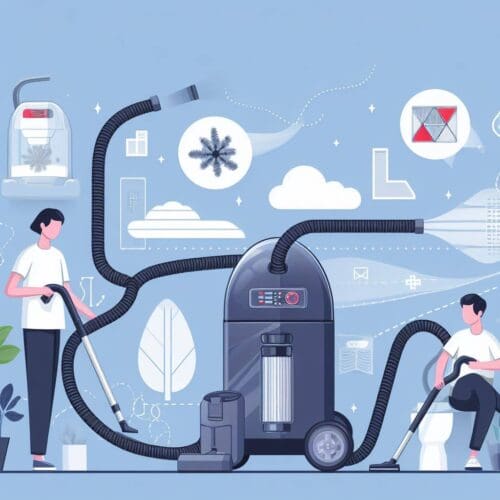Understanding HEPA Filtration in Vacuum Cleaners: Benefits for People with Allergies and Asthma

Understanding HEPA Filtration in Vacuum Cleaners: Benefits for People with Allergies and Asthma
The air quality in our homes has a big impact on our general health and well-being. Many individuals are seeking ways to make sure the air they breathe indoors is as pure as possible due to the growth in allergies and pollution in the environment. The HEPA filter, which is frequently seen in vacuum cleaners, is one of the options that has surfaced in recent years. We’ll go into the definition of HEPA filtration and its advantages in this post, particularly for people with allergies or asthma.
HEPA filtration: what is it?
High Efficiency Particulate Air is referred to as HEPA. A human hair is roughly 50–70 microns broad, therefore to put this into perspective, a HEPA filter is made to capture at least 99.97% of particles with a width of 0.3 microns. This indicates that the great majority of dangerous particles—such as dust mites, pollen, pet dander, and even certain bacteria—are captured by the filter and kept from returning to the atmosphere.
Advantages for People with Asthma and Allergies:
Reduced Allergens: Using a vacuum with a HEPA filter can greatly reduce the number of common household allergens, such as dust mites or pet dander, in the air for people who are allergic to them. Living conditions may become more pleasant and allergy reactions may decrease as a result.
Protection Against Asthma Triggers: Dust, mold spores, and pollen are just a few of the particles that can cause an asthma attack. HEPA filters can lessen the chance of asthma attacks in those who are sensitive by capturing these particles.
Improved Air Quality: HEPA filters can improve indoor air quality, even for people without allergies or asthma. Better respiratory health and a decreased chance of respiratory disorders can result from a cleaner atmosphere.
Less Dust: As a bonus, users of HEPA-filtered vacuums may observe less dust collecting on surfaces, which contributes to a cleaner home overall. This is because HEPA-filtered vacuums are effective at capturing even the smallest particles.
Considerations for Purchasing a HEPA Vacuum:
Comparing true HEPA with HEPA-like: Exercise caution. “HEPA-like” or “HEPA-type” filters, which are not subject to the same strict regulations as genuine HEPA filters, may be advertised by certain vacuums.
Maintenance: Over time, clogged HEPA filters can lose some of their effectiveness. To maintain optimal performance, make sure you check and replace the filter on a regular basis, following the manufacturer’s recommendations.
Sealed System: Seek out vacuums with a fully sealed system to reap the greatest benefits. By ensuring that all air travels through the HEPA filter rather than around it, this ensures that the claimed 99.97% of particles are captured.
In conclusion, buying a vacuum cleaner with a true HEPA filter can make all the difference for people who have allergies, asthma, or just wish to enhance the quality of the air in their homes. We can breathe easier and have healthier lives when the air is cleaner.

Keep connected with us.
Please add your e-mail or follow us on Facebook, we will send you tips, recommendations and valuable information about cleaning topics.
GET UPDATES No charge. Unsubscribe anytime.